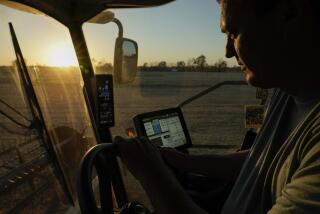Future of Tobacco Growing Unclear
- Share via
CYNTHIANA, Ky. — Jess Burrier has embraced the free market as he turns former grassland into tobacco fields.
The grower is nearly tripling his tobacco acreage, a result of a buyout passed by Congress that ended Depression-era production and price controls. He is planting 70 acres this spring, up from 27 acres in 2004.
“I try to hold my head and look forward to everything,” said Burrier, who expects tobacco to be his most-profitable enterprise, even as his beef herd fetches sky-high prices. He watched as his hired hands methodically set rows of burley in a field previously planted in grass and alfalfa, making sure the tiny plants were secure in the ground.
He is in the minority. Since last year’s buyout, legions of farmers quit production. Others sticking it out are cautiously waiting to see how tobacco companies treat them. A U.S. Department of Agriculture report projected a 31% drop in burley acreage in Kentucky, which traditionally produces 70% of the nation’s burley, the lighter-colored tobacco used in cigarettes.
The buyout will funnel about $10 billion to U.S. tobacco farmers over the next decade as compensation for abolishing minimum price guarantees along with production limits. But without that safety net of price guarantees, experts forecast farmers could get about 50 cents per pound less for their burley. Cash receipts in Kentucky will plummet from $924 million in 1998 to about $300 million for this year’s crop, projected Will Snell, a University of Kentucky tobacco economist.
About two-thirds of the 30,000 tobacco farms that dotted the Kentucky landscape three years ago could be gone this year, Snell said. “It’s kind of a touch-and-go situation. I think the growers are trying to feel out the companies. And the companies are trying to see who’s interested in staying in the game and who can be a low-cost producer.”
Burrier realizes not everyone is upbeat about raising tobacco without price supports to cushion farmers from a poor crop.
“Right now is a real time of change because people don’t know whether to get in, whether to get out,” he said. “A lot of people said, ‘Well, I’ll try it a year,’ or ‘I’ll try it two years.’ ”
In meetings with growers, Snell said he’d asked for a show of hands to gauge their plans. Commonly, about half the crowd indicated it was getting out of tobacco. Less than 10% said they would increase production.
Burrier, the son of a tobacco farmer, was ready to expand his operation when Congress scrapped the quotas. He has plenty of renovated barn space to cure large amounts of tobacco leaves and new equipment that is more efficient.
Quotas restricted his tobacco production in the past and he shied away from leasing other farmers’ quotas because of high prices. Burrier doesn’t miss the production limits, but he acknowledged he would long for the price supports when he took his crop to market.
For years, stability reigned over tobacco, and the “golden leaf” was a consistent moneymaker -- yielding profits that easily surpassed any other legal crop in Kentucky. Tobacco income paid off mortgages, bought pickup trucks and put kids through college.
“I don’t know of anything that I’ve ever had that was good that didn’t come from a tobacco check,” said Paul Tucker, who farms in Harrison County.
As the free market takes root, farmers accustomed to unpredictable weather now have more uncertainties.
Gary Carter, the agricultural extension agent in Harrison County, worries what will happen if he brings in a subpar crop because of bad weather. “The price-support system could help you in a year when you had troubles. Now I get the feeling that if I have poor quality, I’ll be paid for poor quality.”
Said Burrier: “I enjoy raising tobacco, but I have no emotional attachment to tobacco. If I can’t make money, I’ll quit tomorrow.”
More to Read
Sign up for Essential California
The most important California stories and recommendations in your inbox every morning.
You may occasionally receive promotional content from the Los Angeles Times.












